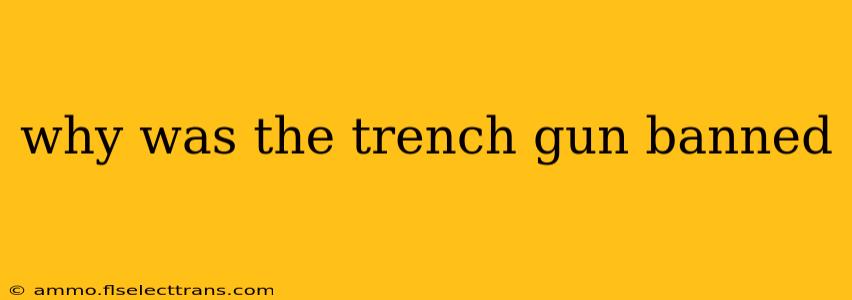The claim that the trench gun, more formally known as the combat shotgun, was banned is a misconception. There's never been a widespread, nationwide ban on shotguns in the United States, nor in most other countries. The confusion likely stems from several factors, including restrictive legislation regarding specific firearm features, evolving societal attitudes towards firearms, and misinformation spread online.
Let's unpack the common misunderstandings and address the reality:
Understanding the "Ban" Myth
The idea of a trench gun ban often arises from a few sources:
-
Restrictions on certain firearm features: Some jurisdictions have regulations concerning specific features like short barrels, high-capacity magazines, or certain types of stocks, which could incidentally affect some models of combat shotguns. However, these restrictions are generally applied to a broader range of firearms and aren't solely targeted at trench guns. They're often based on concerns about public safety and the potential for misuse, not on any inherent characteristic of the trench gun itself.
-
Changes in military and police use: While trench guns were heavily utilized in World War I, their role in modern warfare and policing has diminished. This shift in practical application doesn't equate to a ban; it simply reflects advancements in weaponry and tactical preferences. The effectiveness of shotguns in close-quarters combat remains undisputed, though they're not the primary weapon system used by most militaries today.
-
Misinformation and online rumors: The internet has unfortunately become a breeding ground for inaccurate claims, including myths about firearm bans. It's crucial to verify information from reputable sources before accepting it as fact.
The Reality: Regulation, Not Prohibition
Instead of a "ban," what we see are various regulations that affect the legal ownership and use of shotguns, including combat shotguns. These regulations vary widely by jurisdiction and often include:
- Licensing requirements: Some states and countries require licenses for owning shotguns.
- Background checks: Purchases are typically subject to background checks to prevent individuals with criminal records from acquiring firearms.
- Restrictions on barrel length: Shorter barrels might be subject to specific licensing or registration requirements due to potential concerns about concealment and increased lethality in certain circumstances. These restrictions are not unique to trench guns.
- Magazine capacity limits: Some areas limit the capacity of shotgun magazines, again aiming to reduce the potential for mass shootings. This isn't specific to trench guns, but it does impact their functionality.
The Trench Gun's Legacy
The trench gun holds a significant place in firearm history, symbolizing close-quarters combat and the evolution of weaponry. While its widespread military use has declined, its legacy remains, influencing modern shotgun design and continuing to hold interest among collectors and enthusiasts. The enduring appeal and historical significance of the trench gun further contribute to the misconception of a nonexistent ban.
In conclusion, the notion of a trench gun ban is misleading. While various regulations govern the ownership and use of shotguns, these are not outright bans and do not specifically target trench guns. The existence of such regulations highlights the ongoing debate surrounding firearm control and public safety, not a specific prohibition of a particular historical firearm.

